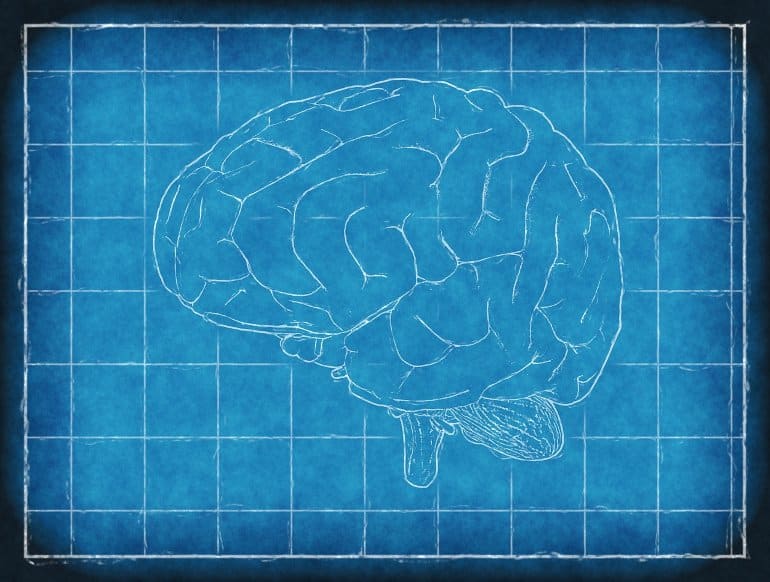Summary: The cerebellum underwent evolutionary changes that may have contributed to the development of language, culture, and tool use in humans, a new study reveals.
Source: PLOS
The cerebellum–a part of the brain once recognized mainly for its role in coordinating movement–underwent evolutionary changes that may have contributed to human culture, language and tool use.
This new finding appears in a study by Elaine Guevara of Duke University and colleagues, published May 6th in the journal PLOS Genetics.
Scientists studying how humans evolved their remarkable capacity to think and learn have frequently focused on the prefrontal cortex, a part of the brain vital for executive functions, like moral reasoning and decision making. But recently, the cerebellum has begun receiving more attention for its role in human cognition.
Guevara and her team investigated the evolution of the cerebellum and the prefrontal cortex by looking for molecular differences between humans, chimpanzees, and rhesus macaque monkeys.
Specifically, they examined genomes from the two types of brain tissue in the three species to find epigenetic differences. These are modifications that do not change the DNA sequence but can affect which genes are turned on and off and can be inherited by future generations.
Compared to chimpanzees and rhesus macaques, humans showed greater epigenetic differences in the cerebellum than the prefrontal cortex, highlighting the importance of the cerebellum in human brain evolution.
The epigenetic differences were especially apparent on genes involved in brain development, brain inflammation, fat metabolism and synaptic plasticity–the strengthening or weakening of connections between neurons depending on how often they are used.
The epigenetic differences identified in the new study are relevant for understanding how the human brain functions and its ability to adapt and make new connections. These epigenetic differences may also be involved in aging and disease.
Previous studies have shown that epigenetic differences between humans and chimpanzees in the prefrontal cortex are associated with genes involved in psychiatric conditions and neurodegeneration.

Overall, the new study affirms the importance of including the cerebellum when studying how the human brain evolved.
Guevara adds, “Our results support an important role for the cerebellum in human brain evolution and suggest that previously identified epigenetic features distinguishing the human neocortex are not unique to the neocortex.”
Funding: The work was supported by funding from the Center for the Advanced Study of Human Paleobiology at The George Washington University (https://cashp.columbian.gwu.edu/) to CCS and EEG, Duke University Department of Evolutionary Anthropology to EEG (https://evolutionaryanthropology.duke.edu/), the James S. McDonnell Foundation (https://www.jsmf.org/) Grant #220020293 to CCS, and National Science Foundation (https://www.nsf.gov/) Grants SMA-1542848 to CCS, WDH, and BJB; EF-2021785 to CCS, and BSC-1919780 to CCS and EEG. The National Chimpanzee Brain Resource was supported by National Institutes of Health (https://www.nih.gov/) Grant NS092988 to CCS and WDH. The funders had no role in study design, data collection and analysis, decision to publish, or preparation of the manuscript.
About this evolutionary neuroscience research news
Source: PLOS
Contact: Press Office – PLOS
Image: The image is in the public domain
Original Research: Open access.
“Comparative analysis reveals distinctive epigenetic features of the human cerebellum” by Elaine Guevara et al. PLOS Genetics
Abstract
Comparative analysis reveals distinctive epigenetic features of the human cerebellum
Identifying the molecular underpinnings of the neural specializations that underlie human cognitive and behavioral traits has long been of considerable interest. Much research on human-specific changes in gene expression and epigenetic marks has focused on the prefrontal cortex, a brain structure distinguished by its role in executive functions.
The cerebellum shows expansion in great apes and is gaining increasing attention for its role in motor skills and cognitive processing, including language. However, relatively few molecular studies of the cerebellum in a comparative evolutionary context have been conducted.
Here, we identify human-specific methylation in the lateral cerebellum relative to the dorsolateral prefrontal cortex, in a comparative study with chimpanzees (Pan troglodytes) and rhesus macaques (Macaca mulatta). Specifically, we profiled genome-wide methylation levels in the three species for each of the two brain structures and identified human-specific differentially methylated genomic regions unique to each structure.
We further identified which differentially methylated regions (DMRs) overlap likely regulatory elements and determined whether associated genes show corresponding species differences in gene expression.
We found greater human-specific methylation in the cerebellum than the dorsolateral prefrontal cortex, with differentially methylated regions overlapping genes involved in several conditions or processes relevant to human neurobiology, including synaptic plasticity, lipid metabolism, neuroinflammation and neurodegeneration, and neurodevelopment, including developmental disorders.
Moreover, our results show some overlap with those of previous studies focused on the neocortex, indicating that such results may be common to multiple brain structures.
These findings further our understanding of the cerebellum in human brain evolution.







